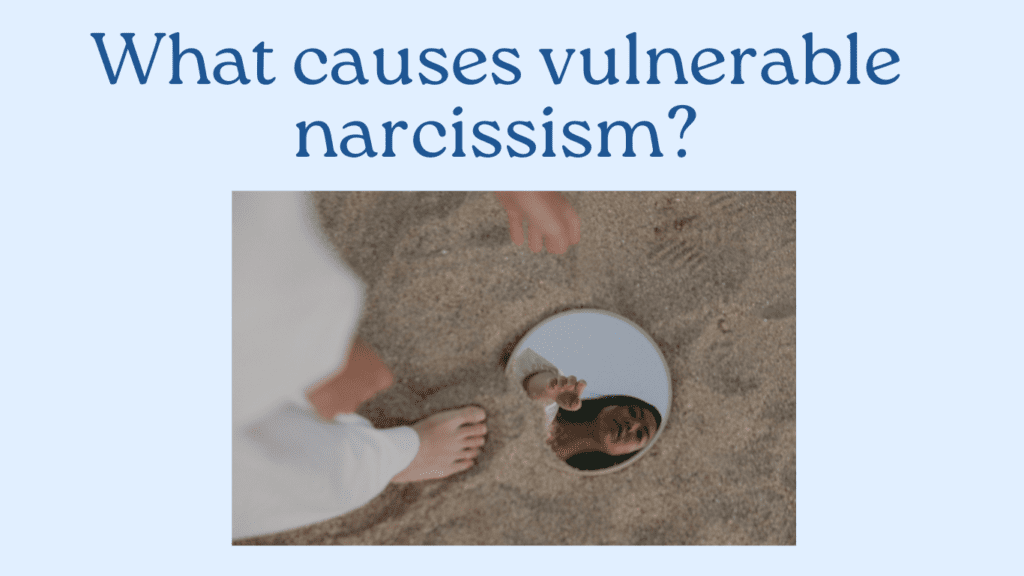Yes, a narcissist makes you feel crazy on purpose—and no, it’s not because they’re just complex or dramatic.
They rely on calculated tactics like gaslighting, projection, and deflection, all designed to protect their fragile egos. The moment you try to hold them accountable, the script flips. Suddenly, you’re the problem, you’re too sensitive, you’re overreacting, and you’re ”remembering it wrong”
Their goal?
In this article, we’ll discuss exactly why the narcissist makes you feel crazy to see through the manipulation finally.
First, How a Narcissist Makes You Feel Crazy
Vulnerable narcissists don’t always come at you with obvious abuse. Instead, they use sneaky psychological tactics that leave you second-guessing your reality. Here are some of their go-to moves:
- Gaslighting: They twist the truth to make you question your memory, your perception, even your sanity.
- Projection: They accuse you of doing exactly what they’re guilty of.
- Deflection: Instead of owning up, they change the subject or turn it back on you.
- Silent treatment: They freeze you out as punishment, leaving you worried and confused.
- Blame shifting: Somehow, no matter what happens, it’s always your fault.
- Triangulation: They drag in other people to manipulate the relationship and make you feel isolated or “less than.”
- Love bombing and withholding: One minute, you’re everything to them. The next, you’re nothing. This emotional wave keeps you chasing their approval.
Now, let’s dive a little deeper into what they’re really after. What’s the real goal behind all this manipulation?
Why a Narcissist Makes You Feel Crazy
1. To Test Boundaries
Narcissists don’t ask for power. They probe for it. They test your boundaries by making small violations—like dismissing your opinion—to see what they can get away with.
Every reaction you give becomes data. If you let slide something once, they take it as permission to push further. They rotate between guilt, confusion, and praise to find which one breaks down your resistance fastest.
For example, if you express hurt, they might ignore your needs and then play the victim, watching carefully to see if you back down or stand firm.
They study your emotional defenses, taking note of weak spots they can exploit. If you don’t hold your ground, they’ll escalate their tactics, turning small boundary-crossings into regular power plays.
2. To Establish Power and Superiority
You start questioning your own memories. You apologize when you’re the one who was hurt. You feel like you’re “too much”.
This isn’t accidental. It’s the vulnerable narcissist’s playbook for dominance.
They don’t need to raise their voice or use overt aggression to dominate. Instead, they destroy you quietly, with dismissive remarks, strategic indifference, or just a casual sigh that makes you wonder, “Wait… was I wrong?”
The more you doubt yourself, the more you seek their approval, and the tighter their grip becomes. And when your judgment feels unreliable, you start relying on their version of reality for clarity.
And the worst part? They craft a persona of calm rationality while portraying you as emotionally unstable or overly sensitive.
As a result, others buy into their version of reality, believing the narcissist’s act as the composed, level-headed one. Meanwhile, the victim is left isolated, unsure, and without anyone to turn.
3. To Direct Outcomes
A narcissist uses your emotions to mess with your mind.
They know exactly what buttons to push—your doubts, fears, and need to feel understood. One minute they’re loving, the next they’re cold. You never know what version of them you’ll get, and that’s the point. It keeps you off-balance.
Meanwhile, while you’re wrapped up in the confusion, they’re busy steering the outcome. They twist your words, deny what happened, and claim you’re overreacting or misremembering. They spin the story to make themselves look like the victim or the hero, while painting you as the problem.
It’s gaslighting disguised as logic. And in the end, they walk away in control, owning the narrative and the power.
4. To destabilize You
Confusion for narcissists isn’t an accident. It’s strategy.
They thrive on chaos, keeping you off-balance and making you question your thoughts, memories, and emotions. The more unstable you feel, the easier it is for them to manage you.
As you start doubting what’s real, they step in to rewrite the story. It also gives them the power to influence your decisions. They’ll push you into choices you’d never make on your own, giving them the upper hand and shaping outcomes in their favor without you even realizing it.
But it doesn’t end there. When you’re uncertain about yourself, they’ll easily shift the blame onto you. It’s a trap, one you don’t even see coming.
And as you grow more lost in your mind, you may start distancing yourself from friends, family, or anyone who could help you see the truth.
5. To Maintain a False Self
Deep down, narcissists fear their shame and insecurity being exposed. To avoid this, a narcissist makes you feel crazy, causing you to doubt your judgment.
This manipulation serves two purposes: it hides their true nature and helps maintain their false self, an illusion of superiority and control.
If their false self were ever challenged, they’d be forced to confront unbearable shame, so instead, they shift focus onto your supposed instability.
And if you’re busy questioning yourself, you’re not noticing their behavior. As a result, they make you more compliant and less likely to question their distorted reality.
6. To Get Narcissistic Supply
Narcissists need constant validation, attention, and admiration to sustain their fragile self-worth and fuel their false self. This is called narcissistic supply.
When they manipulate you into doubting your sanity, they create emotional dependency and chaos. As a result, this keeps you hooked and feeds their supply in several ways.
Also, if you’re confused, you’ll obsess over “figuring out” the narcissist, trying to make sense of their mixed signals.
Finally, your frustration, anger, or attempts to “prove” reality to them still give them attention, which is all they want.
7. To Avoid Vulnerability or Shame
Narcissists can’t tolerate feeling flawed, so they accuse you of being irrational, oversensitive, or “crazy.” That way, they don’t have to take any responsibility and can keep up the illusion of perfection.
If you’re busy defending your sanity, you won’t notice their lies or flaws. And if they sense you’re about to figure them out, they’ll provoke you into reacting and then turn it around, making you seem unstable.
Even if you’re telling the truth, people— including you— might start doubting it because “you’re just too emotional.”
Conclusion
A narcissist makes you feel crazy to cause you to accept mistreatment and doubt your worth. They distort your reality to protect their fragile egos and maintain control. Through tactics like gaslighting, projection, and deflection, they leave you questioning your perceptions and feeling overwhelmed.
Why? Because they’re testing your boundaries, trying to control every outcome, and maintaining their false self. They also want to destabilize you to feed their need for constant validation and narcissistic supply, all while avoiding vulnerability or shame.
So set clear boundaries and stick to them. Also, trust your instincts, and when the pressure gets too much, seek support from trusted friends or professionals who can help you.
Also, read: What causes vulnerable narcissism?


